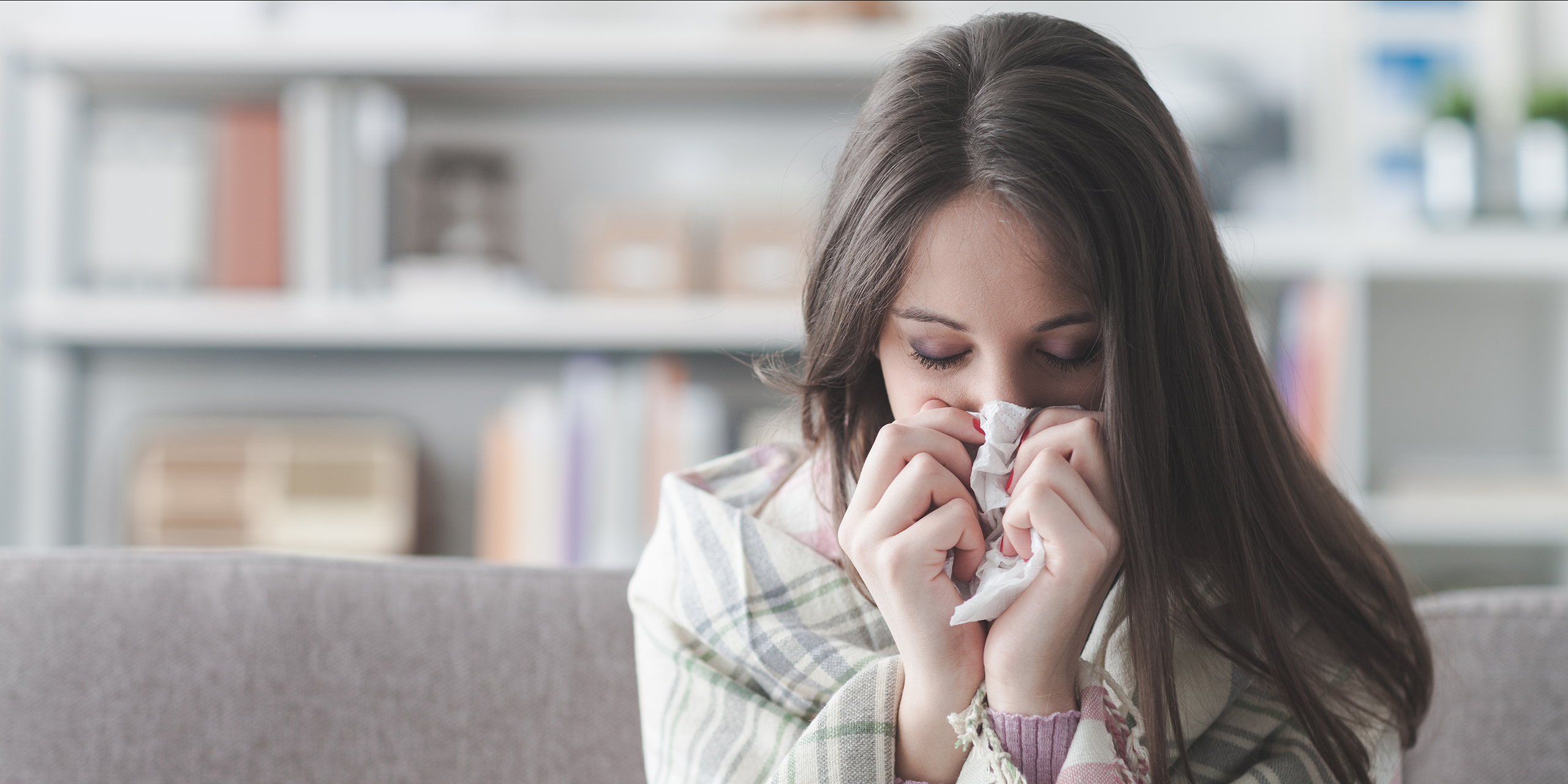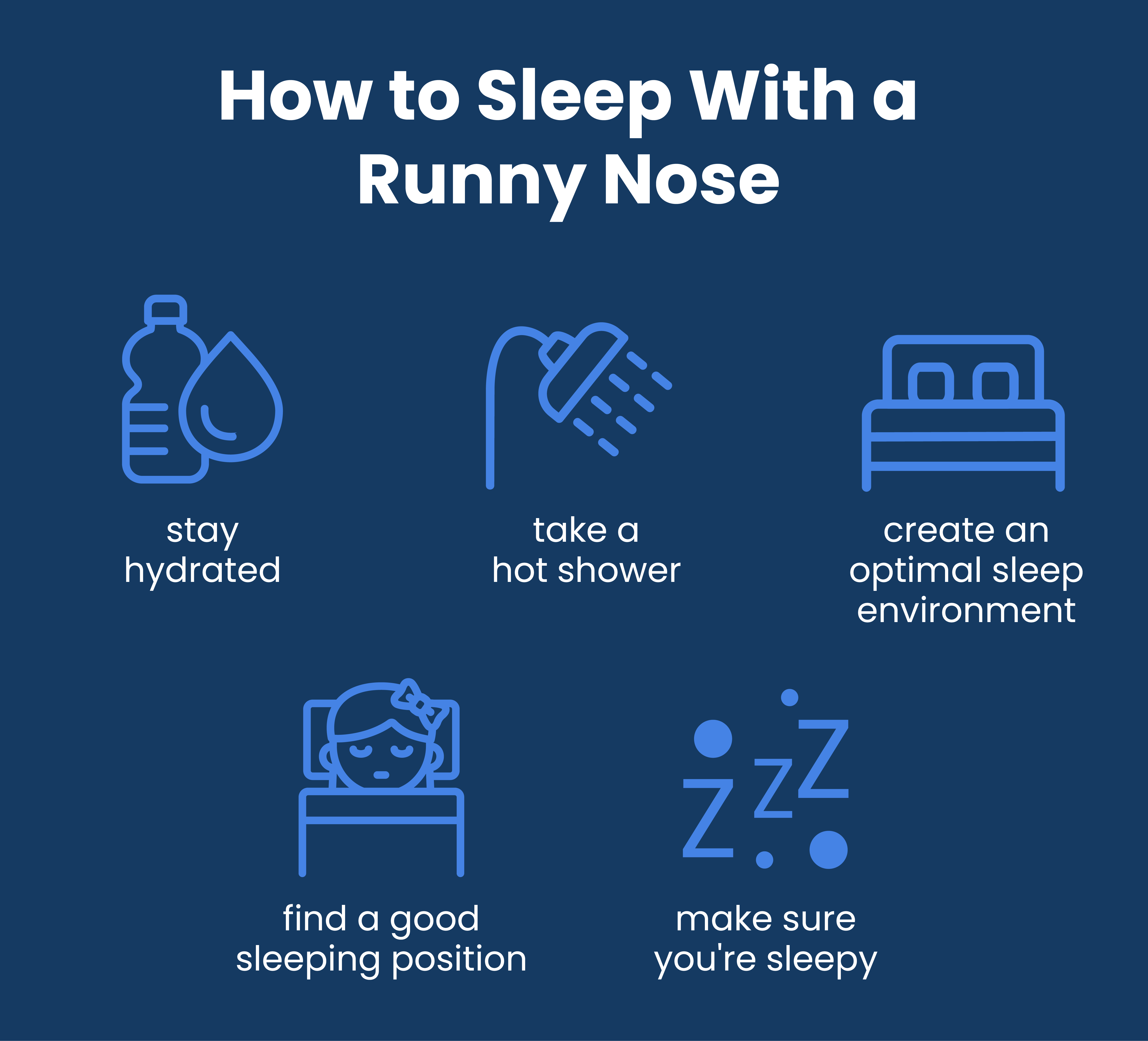6 Tips on How to Sleep with a Cold

Despite the recent increase in global awareness about germs and hygiene, the winter months still breed the common cold and flu. If you’re one of the unlucky ones to contract these winter ailments, the best you can do is treat your symptoms and allow your immune system to do the rest. One of the primary reasons it’s so difficult to sleep with a cold is your body is actively fighting the virus with every tool available. Not only does this mean your systems aren’t focusing on their usual ‘maintenance’ as much, but it also means immune system responses such as a runny nose, sore throat, or even a fever. You may not get the best sleep you’ve ever had, but we’ve got some ideas to make your Zzzs a little better while battling a cold.
How to Sleep When You Have a Cold

1. Explore Over-the-Counter Remedies
If you’re feeling stuffy, hot, achy, or all of the above, there are medications available from your local drug store you can try that may temporarily alleviate your symptoms. Always be sure to read the ingredients and dosages before consuming any medications. Some medications should not be taken together, and others may not improve your specific symptoms. If you have questions about what’s right for your illness, consult with the pharmacist before purchasing. Getting the right symptom reliever could mean quieting your cough, clearing your sinuses, and reducing your fever and feelings of achiness, so you can enjoy some much needed, uninterrupted rest. If your symptoms don’t improve soon, or if they seem to be getting worse, contact your doctor to find out if you would benefit from taking prescription medication.
2. Take a Steamy Hot Shower
If your sinuses are running like a leaky pipe, it can feel like a losing battle trying to get them clear. Taking a hot shower with lots of steam can help loosen up mucus and soothe your uncomfortable sinuses. Use this time to clear out your runny nose so you can lay off the tissues when you go to bed. The warmth will also relax your tired body, so you’ll be closer to the ideal sleeping temperature and sleep will come more swiftly. In addition, we recommend warming up your feet and keeping them warm and comfortable in bed to help speed up the process of falling asleep.
3. Create an Optimal Sleep Environment
Winter illnesses can be made worse by certain environmental conditions. Investing in an air purifier to help remove irritants that may further worsen your cold symptoms, or investing in a good humidifier to add moisture in the air that will keep your nose and throat soothed and comfortable, are steps to creating a more ideal sleeping area. A common mistake that cold sufferers make is cranking up the heat when they go to bed. A cool bedroom temperature (around 60-68F) will help reduce sweating and waking up at night, which is particularly important if you’re experiencing a fever.
4. Stay Hydrated
There’s a reason doctors commonly recommend lots of fluids and bed rest when you’re sick. When battling a cold, your body is losing water via sweat, mucus, and other immune responses, and therefore it’s important to increase the amount of water you’re taking in. Just be careful not to drink too much before bed or you may be making unwanted trips to the restroom throughout the night. A hot, caffeine-free tea or other caffeine-free beverage is a great way to give your sore throat some relief from cold symptoms in the evening.
5. Find a Good Sleeping Position
Experts suggest that particular positions can help or hinder sleep when you have a cold. When you sleep on your back, it can make congestion even worse. Try sleeping on your side, and prop up your pillows so you’re sleeping at a slight angle to help prevent congestion from disrupting your sleep.
6. Make Sure You’re Sleepy
If you find yourself tossing and turning in bed, unable to relax or get comfortable, get out of bed and do something else for a bit. Go into another room to read a book under dim light, listen to music or soothing sounds from a white noise machine, or try some other low-intensity activity until you feel sleepy. Waiting until you feel ready for sleep before getting into bed will promote healthier sleep habits year-round.
The good news is the common cold and flu generally only last a few weeks at most. They’re uncomfortable and irritating, but they’re just another part of life. Take steps to avoid getting sick like wearing a mask in public spaces, maintaining physical distance from others, frequently washing your hands with soap, using antibacterial hand sanitizer, and steering clear of sick friends and family. If you do get sick, try your best to implement these tips to help you get good sleep while keeping in mind that some things may work better or worse for your own body. Following these suggestions should put you on the fast track to recovery, so you’ll soon be feeling well-rested and ready to resume your regular activities.
Not sure if you’re getting the recommended amount of sleep for your age and gender, whether or not you’re feeling under the weather? Download the SleepScore App from the App Store or Google Play Store for free, to see how your sleep changes over time and to get personalized insights about your sleep.